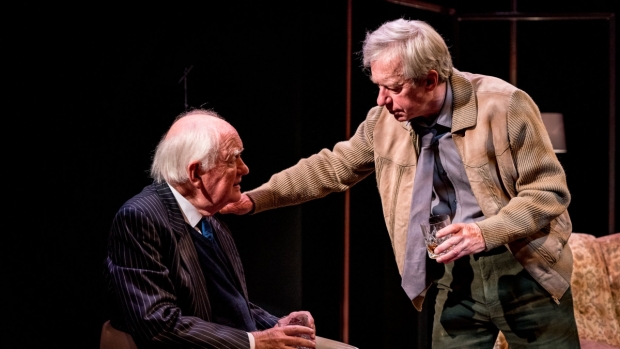
© Steve Gregson
Even if a play set in late 1980s Moscow as the Cold War thaws and novelist Graham Greene reacquaints with former friend and colleague, Soviet spy Kim Philby, is unlikely to have much appeal to a younger generation of theatregoers, one thing that never goes out of fashion is great acting. Ben Brown's meticulously researched piece is so exquisitely performed that every drama student in the capital should get themselves down Jermyn Street's subterranean staircase to witness this world-class trio of actors up close.
Making up in craftsmanship and intelligence for what it lacks in dynamism, Alan Strachan and Alastair Whatley's low-key but immaculate production is a masterclass in restraint and detail, the kind of thing that might have flourished on Shaftesbury Avenue 40 years ago. Seen in 2021 though, it feels, for all the craft and intimations of espionage, like a bit of a throwback, an old-fashioned talk piece couched in reminiscence and anecdote but almost zero action or even plot.
The premise is straightforward: celebrated novelist and onetime MI6 agent Greene (Oliver Ford Davies), in the Soviet capital for a Peace Conference, visits the home of his former MI6 boss, and now high profile defector Kim Philby and his Russian wife Rufa (Stephen Boxer and Karen Ascoe respectively): Michael Pavelka's set nicely contrasts the down-at-heel charm of the Philby's home with the grandeur of iconic Muscovite architecture. Greene hasn't seen his estranged friend for 35 years and what drama there is derives from a certain ambiguity about how much he'd previously known of Philby's treacherous activities, and an underlying resentment between the two men. If the stakes don't feel particularly high, there are a pair of curveballs – both in connection with Philby – thrown in the second act that up the ante somewhat, and raise the theatrical temperature above tepid.
Brown's dialogue is witty and civilised but the play as a whole is saved from inertia by the performances. To see an actor of the calibre of Oliver Ford Davies (his Lear for the Almeida remains the finest account of that role I've ever seen) in the intimate confines of a studio theatre is an absolute privilege. His Greene is affable but steely with a gentle air of forlorn bewilderment, a man never fully comfortable in his own skin despite all the acclaim and success. Even watching him listen to the other characters talking is an object lesson in stagecraft and mastery of subtext.
In the showier role, Stephen Boxer gives Philby a garrulous charm that suddenly and unsettlingly shuts down into a brutal, blank-eyed stare. He entirely convinces as a clubbable fellow fully capable of precipitating the deaths of younger colleagues because they don't fit into the master plan. Karen Ascoe delivers a really beautiful performance (with a flawless Russian accent) as his selfless, watchful wife, her devotion subtly shaded with ambivalence and despair. Her rueful recounting, at the top of act two, of their first meeting is exquisitely handled.
The title derives from Greene's point that, to be a ruthless observer of mankind, a writer possesses "a splinter of ice" in their heart, while going on to opine that a spy needs a full icicle at their very core in order to carry out their missions.
All in all, this is a feast of fine acting atop a decent, if occasionally uninspired, script. Graham Greene fans will get an additional kick out of spotting the allusions to the writer's oeuvre, and even the beloved theme tune from The Third Man movie gets a look in!












